|
|
|
Sort Order |
|
|
|
Items / Page
|
|
|
|
|
|
|
| Srl | Item |
| 1 |
ID:
152969
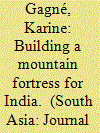

|
|
|
|
|
| Summary/Abstract |
This article examines the relationship between affect and the state in post-colonial India, foregrounding sympathy as a feeling that arises from the embodied encounters and interactions between the state and a local population through state-building in the Himalayas. It establishes the emergence of sympathy in the materiality of the Himalayas and in the historical conjuncture of the passage to Indian nationhood in Ladakh, which was marked by the mobilisation of the local population in the defence of the territory of India amid the first Indo-Pakistani war (1947–48). This article argues that sympathy, in leading the state to reimagine the population of Ladakh, is integral to the reconfiguration of the region into a border area and to the rethinking of the sovereignty of the Indian state at its Himalayan frontier.
|
|
|
|
|
|
|
|
|
|
|
|
|
|
|
|
| 2 |
ID:
106662
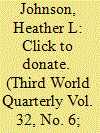

|
|
|
|
|
| Publication |
2011.
|
| Summary/Abstract |
This article investigates the role of visual representation through images in the international refugee regime, with a particular focus on the female refugee. I argue that visual representation illustrated by the photo archives of the unhcr in particular, but also in other institutional sources, plays a crucial role in shaping our imaginations and knowledges, and that its dynamics are important in understanding the politics of asylum. As the international refugee regime institutionalised by the unhcr has developed, the imagination of the refugee has undergone three concurrent shifts: racialisation, victimisation and feminisation. Each of these shifts has contributed to changing policies and practices in the regime, particularly the change in 'preferred solution' from integration to repatriation or, where possible, prevention. More importantly, these shifts have all operated within a discourse of depoliticisation of the refugee, denying the figure of the refugee the capacity for political agency. This depoliticisation works through the construction of the 'female' refugee, indicating important lessons for our understandings of the political agency of both women and non-citizens.
|
|
|
|
|
|
|
|
|
|
|
|
|
|
|
|
| 3 |
ID:
099104


|
|
|
|
|
| Publication |
2010.
|
| Summary/Abstract |
Do members of Congress put human rights concerns on the agenda in response to their constituents' demands for trade protection? Humanitarian concern may be an important motive, but the normative weight of these issues also makes them a potentially powerful tool for politicians with less elevated agendas. They may criticize the behavior of countries with whom their constituents must compete economically, while overlooking the actions of countries with which their constituents have more harmonious economic relations. This paper tests several hypotheses about the salience of human rights concerns in the politics of US foreign policy using data on congressional speeches during the late 1990s gathered from the Congressional Record. We find evidence that, while humanitarian interests remain an important motive for raising human rights issues, the economic interests of their constituents influence which members of Congress speak out on these questions, and the countries on which they focus their concern.
|
|
|
|
|
|
|
|
|
|
|
|
|
|
|
|
| 4 |
ID:
085894


|
|
|
|
|
| Publication |
2009.
|
| Summary/Abstract |
An absolutist concept of property has the power to shape and constrain the public imagination. Libertarian theorists normatively embrace this concept. Yet its influence extends far beyond these proponents, shaping the views of an otherwise diverse array of theorists and activists. This limits the ability of environmentalists, among others, to respond coherently to challenges from property rights advocates in the U.S. I sketch an alternative concept-rooted in practice-that understands private property as necessarily embedded in social and ecological relations, rather than constrained by these relations. I argue that this concept can prefigure a more robust environmentalism.
|
|
|
|
|
|
|
|
|
|
|
|
|
|
|
|
| 5 |
ID:
066650
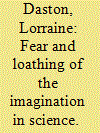

|
|
|
| 6 |
ID:
139582
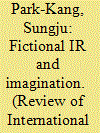

|
|
|
|
|
| Summary/Abstract |
In the field of International Relations (IR), narrative approaches and an alternative way of writing seem to have gained growing attention in recent scholarship. Autoethnography and autobiography can be taken as primary examples. The article aims to advance this growing scholarship by proposing the concept of fictional IR. The idea is concerned with how to use the imagination in IR. I suggest that fiction writing can become a method for dealing with lack of information and contingency surrounding it. Fictional IR is more than reading and using fiction as a reference source or vehicle for analysis. It can incorporate the employment of fiction writing in IR scholarship. One of the benefits could be to articulate sensitive and complicated problems in a more flexible and imaginative way, making the most of the power of story and imagination. It should be stressed that the focal point is to write fiction; it is not to write about fiction. To support this suggestion, the article offers a short fictional-factual story. By using imagination, creating characters, combining data with fictional narrative, or with one's own experience, I believe that more original and empathetic IR writing is possible.
|
|
|
|
|
|
|
|
|
|
|
|
|
|
|
|
| 7 |
ID:
108908
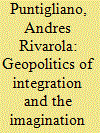

|
|
|
|
|
| Publication |
2011.
|
| Summary/Abstract |
The main tenet of this article is to argue that the process of regionalisation in Latin America is entering into a new phase, where South America is consolidating an own process of regional integration. From being not more than a geographical expression, South America is rapidly becoming a political and economic entity with increasing international actorhood. One important difference to the past is that there is now a 'core state', Brazil, with a clear strategy directed towards deepening South American integration. Yet, Brazil is not alone; there is also an increasing convergence with other South American states and old rivalries are being substituted for increased cooperation in areas such as economy, infrastructure, energy, security or aid. As this article explains, the logic of action of the forces behind the process of integration can be understood by analysing the evolution of South American geopolitical current called 'geopolitics of integration'.
|
|
|
|
|
|
|
|
|
|
|
|
|
|
|
|
| 8 |
ID:
092878
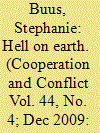

|
|
|
|
|
| Publication |
2009.
|
| Summary/Abstract |
A number of security scholars and policy-makers now approach the fictional narratives of popular culture as both a source of and a tool for imagining current and future threats and risks following the 'failure of imagination' that was 9/11. Building on this line of thought, this article assumes that contemporary popular fiction may be important to explorations of national and global security not only because elements of the security community have begun to turn to popular fiction in security scenario thinking and planning, but because people themselves have long turned to the popular cultural works that surround them as a particularly accessible source of security scenarios, thinking and even security practices. With the help of critical literary and cultural theories around the supernatural and crime narratology, as well as existing critical security studies scholarship, this article examines two contemporary popular cultural narratives, 'Buffy the Vampire Slayer' from the United States and the Martin Beck series from Sweden, and asks how each narrative can be said to depict the new global security environment and the notion of borderless threats. How does a popular cultural fantasy narrative about energetic teens and demons in America's low-welfare 'Ownership Society' represent the internal-external security boundary as compared with a long-standing popular realist narrative about tired cops and crime in Sweden's high-welfare 'People's Home'? Although such a comparison may at first seem far-fetched, in this article I argue that comparing apples and oranges in this instance proves valuable, since the differing fictional modes at work in 'Buffy' and 'Beck' not only have much to say about the kinds of internal-external security images and actors that are presented in each, but also the kind of 'security imagination' that each narrative makes possible.
|
|
|
|
|
|
|
|
|
|
|
|
|
|
|
|
| 9 |
ID:
120405
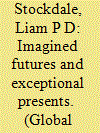

|
|
|
|
|
| Publication |
2013.
|
| Summary/Abstract |
This article critically considers what is at stake with the emergence of a 'pre-emptive' politics of security based upon governing the future through anticipatory interventions in the present. It begins by developing a detailed account of how the idea of pre-emption has come to inform the global governance of (in)security in the post-9/11 era. It then turns to a discussion of the logic of pre-emptive security itself. Here it is argued that its focus upon the future implies a prioritization of the imagination in its decisional logic, which has the effect of enhancing the degree of discretionary subjectivity granted to state authorities under a pre-emptive approach. The article then expands upon this claim by considering how it suggests an important conceptual link between a politics of pre-emption and political exceptionalism. It then concludes that the very notion of pre-emptive security can be seen as conceptually incoherent, since this link serves to compromise its capacity to produce a condition congruent with the understanding of 'security' presupposed by its own normative framework. Accordingly, the practical viability and political legitimacy of pre-emption as a rationality for (in)security governance can be seriously called into question.
|
|
|
|
|
|
|
|
|
|
|
|
|
|
|
|
| 10 |
ID:
178874
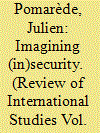

|
|
|
|
|
| Summary/Abstract |
How do scenarios of dangerous futures imagined in the framework of the post-9/11 counterterrorism shape security institutions? Critical Security Studies (CSS)'s dominant answer is that state apparatus are significantly transformed by the use of new technologies of prediction that are very prolific in imagining potential risks. The present article questions this technologically determinist thesis. Introducing the notion of weak field in the study of pre-emption, it argues that the political sociology of transnational fields of power can help us in historicise and assess more precisely the impact of imagination over power and control in the pre-emptive era. The article analyses NATO's reaction to 9/11 as a case study. It shows how the fabrication of potential terrorist threats by NATO's practitioners, that served to justify the pre-emptive use of the collective self-defence clause of the Washington Treaty (Article 5), evolved into an ambiguous support for NATO's military policing of the Mediterranean basin and into its involvement in migration control.
|
|
|
|
|
|
|
|
|
|
|
|
|
|
|
|
| 11 |
ID:
130384
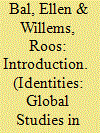

|
|
|
|
|
| Publication |
2014.
|
| Summary/Abstract |
This special issue addresses the imagination of futures 'away from home' in a globalising world. While a growing number of migration scholars have taken into account that migration considerations are always socially embedded and culturally informed, the processes at work among a mounting number of (young) men and women throughout the world, who are convinced that a better life can only be found 'away from home', have been notably understudied. This special issue goes beyond the study of migration aspirations as a question of migration only. It focuses on the specific contexts (in five different countries) within which migration dreams are born, and sometimes even cultivated. It explores the sociocultural embedding of these aspirations by investigating the interpretation of local realities versus global possibilities, and examines how the aspirations of so many worldwide link up to the wider interconnections between globalisation and the sociocultural, political and economic transformations 'back home'.
|
|
|
|
|
|
|
|
|
|
|
|
|
|
|
|
| 12 |
ID:
100847
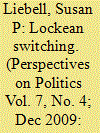

|
|
|
|
|
| Publication |
2009.
|
| Summary/Abstract |
John Locke's A Letter Concerning Toleration introduces an early form of John Rawls's "original position" in order to shift the rhetorical ground in seventeenth-century England in favor of religious toleration. His method, which I call "Lockean switching," seeks to induce readers to switch perspectives on the question of coercion of religious belief. This method yields three insights. First, although liberals typically assume that group identification stimulates passions beyond our ability to reason, Lockean switching reveals that the emotive qualities of group interest can actually help reinforce our commitment to and understanding of liberal principles. Locke thus insists that imagination and emotional response can encourage reason and increase impartiality. Locke's carefully crafted scenarios force readers to consider hard political questions, something underscored by comparing Locke's rhetorical strategies with those of two other important liberals, Montesquieu and Rawls. Second, Locke's invocation of remote "outsiders" such as Jews and pagans humanizes the hated minorities of his time and place. But it also risks reifying the majority group and inflaming prejudice. Finally, Lockean switching reminds us that liberals must be alert to the dangers of pushing readers to accept principles that are reasonable but impossible to implement. By exploring Locke's method of shifting perspectives, and connecting it to a broader liberal tradition of "switching," I argue that contemporary liberals can use imagination and group identification to help reinforce the commitment of individuals and groups to liberal principles with which they might not otherwise identify. I conclude by illustrating this with regard to controversies surrounding the toleration of gays, lesbians and transgendered individuals in the US.
|
|
|
|
|
|
|
|
|
|
|
|
|
|
|
|
| 13 |
ID:
163255
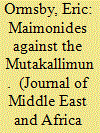

|
|
|
|
|
| Summary/Abstract |
In his Guide of the Perplexed, Maimonides criticizes certain unnamed Muslim theologians, especially with regard to their views on possibility. Maimonides identifies these views as stemming from the theologians’ espousal of the notion of “intellectual admissibility.” By this, they seem to mean that whatever is conceivable is possible in actuality. Maimonides strongly rejects this notion, as it appears to undermine any rational order in the world. This article explores this notion, and attempts to define what disturbed Maimonides so powerfully about its implications. At the same time, it becomes clear that Maimonides shares certain views of the theologians, even if for quite different reasons.
|
|
|
|
|
|
|
|
|
|
|
|
|
|
|
|
| 14 |
ID:
148405
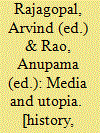

|
|
|
|
|
| Publication |
Oxon, Routledge, 2016.
|
| Description |
xvi, 353p.: figures, plateshbk
|
| Series |
Critical Interventions in Theory and Praxis
|
| Standard Number |
9781138220119
|
|
|
|
|
|
|
|
|
|
|
|
Copies: C:1/I:0,R:0,Q:0
Circulation
| Accession# | Call# | Current Location | Status | Policy | Location |
| 058860 | 323.445/RAJ 058860 | Main | On Shelf | General | |
|
|
|
|
| 15 |
ID:
066979
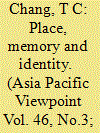

|
|
|
| 16 |
ID:
181333
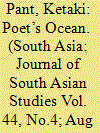

|
|
|
|
|
| Summary/Abstract |
This essay explores an unusual vernacular source of poetic writings by Asim Randeri (1904–2009), a Muslim poet from a merchant family of Gujarat, in order to understand how the imagination—particularly when engaged through poetry and piety—became a charged realm in which Indian Muslims responded to British colonial pressure on them, expressing the itinerancy at the heart of mercantile life that separated individuals from their families, port city and wider community. Recent scholarship has focused on the economic pursuits of Gujarati merchants in port cities across the Indian Ocean in the nineteenth and twentieth centuries and even earlier. This article shifts the analysis to their diasporic imagination, as a correlate of itinerant commerce. Through this essay, I reflect on the many temporalities and internal social dynamics at play in the mercantile imaginations that emerge from Gujarati trader communities. These, I demonstrate, provide a sharp contrast to the short-term framing emphasised by Western historiographical traditions rooted in linear history and colonial records.
|
|
|
|
|
|
|
|
|
|
|
|
|
|
|
|
| 17 |
ID:
093582
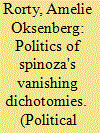

|
|
|
|
|
| Publication |
2010.
|
| Summary/Abstract |
Spinoza's project of showing how the mind can be freed from its passive affects and the State from its divisive factions (E IV.Appendix and V.Preface) ultimately coincides with the aims announced in the subtitle of the Tractatus-Theologico-Politicus (TTP) "to demonstrate that [the] freedom to philosophize does not endanger the piety and obedience required for civic peace."1 Both projects rest on a set of provisional isomorphic distinctions-between adequate and inadequate ideas, between reason and the imagination, between active and passive affects-that Spinoza proceeds to blur, and indeed to renounce. In using these distinctions while also moving to overcome them, Spinoza is not confused or indecisive. Every philosopher, every wise Sovereign, every free man who attempts to incorporate adequate ideas in inadequately framed, perspectivally limited contexts must use these distinctions and also see how deeply misleading they are. I want to offer a friendly amendment to Hasana Sharpe's essay "The Force of Ideas in Spinoza" arguing that Spinoza refuses her distinction between the force of an idea and its truth.2
|
|
|
|
|
|
|
|
|
|
|
|
|
|
|
|
| 18 |
ID:
113898
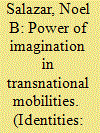

|
|
|
|
|
| Publication |
2011.
|
| Summary/Abstract |
At the roots of many travels to distant destinations, whether in the context of tourism or migration, are historically laden and socioculturally constructed imaginaries. People worldwide rely on such imaginaries, from the most spectacular fantasies to the most mundane reveries, to shape identities of themselves and others. These unspoken representational assemblages are powerful because they enact and construct peoples and places, implying multiple, often conflicting, representations of Otherness, and questioning several core values multicultural societies hold, by blurring as well as enforcing traditional territorial, social, and cultural boundaries. What are the contours of power, agency, and subjectivity in imaginaries of transnational mobility and the intersecting social categories those visions both reify and dissolve? Ethnographic studies of human (im)mobility provide an innovative means to grasp the complexity of the global circulation of people and the world-making images and ideas surrounding these movements. As a polymorphic concept, mobility invites us to renew our theorizing, especially regarding conventional themes such as culture, identity, and transnational relationships. This article critically analyzes some preliminary findings of an ongoing multisited research project that traces how prevalent imaginaries of transnational tourism to and migration from the "global South" are (dis)connected. I suggest anthropology has unique contributions to make to the current debate in the social sciences by ethnographically detailing how mobility is a contested ideological construct involving so much more than mere movement.
|
|
|
|
|
|
|
|
|
|
|
|
|
|
|
|
| 19 |
ID:
085893
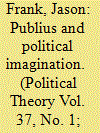

|
|
|
|
|
| Publication |
2009.
|
| Summary/Abstract |
The Federalist is commonly read as an exemplar of political realism. However, alongside Publius' arguments against the enthusiastic imagination- its tendency to inflame the passions, betray the intellect, and subvert political authority-are formative appeals to the imagination's role in reconstituting the public authority shaken during the postrevolutionary years. This essay explores three central aspects of Publius' restorative appeal to the imagination: the appeal to the public veneration required for sustaining political authority across time; the strategies for shifting citizen loyalty from the state and local level to that of a newly energized federal government; and the rhetorical elicitation of the public's imagination in aestheticized portrayals of Providential nationality. These aspects of Publius' argument make up the core of The Federalist's aesthetics of (self) rule. In each instance, Publius invokes the imagination as a heteronomic support to navigate familiar dilemmas of democratic self-authorization.
|
|
|
|
|
|
|
|
|
|
|
|
|
|
|
|
| 20 |
ID:
077543
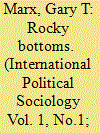

|
|
|
|
|
| Publication |
2007.
|
| Summary/Abstract |
This article uses a true fiction speech by Mr. Richard Rocky Bottoms to illustrate a number of background beliefs underlying contemporary perspectives on social control, borders and surveillance, and on technology more broadly. Rocky Bottoms exists only in the imagination, but the arguments he puts forth and the behavior he reflects are prevalent, and increasingly dominant, in the post-9/11 cultures of industrial nations. His speech is a composite of remarks, many of them direct quotes, that I have gathered as part of a research project on surveillance over several decades. The speech is critically analyzed in light of 38 techno-fallacies of the information age. The fallacies identified may involve empirical, logical, or value dimensions.
|
|
|
|
|
|
|
|
|
|
|
|
|
|
|
|
|
|
|
|
|